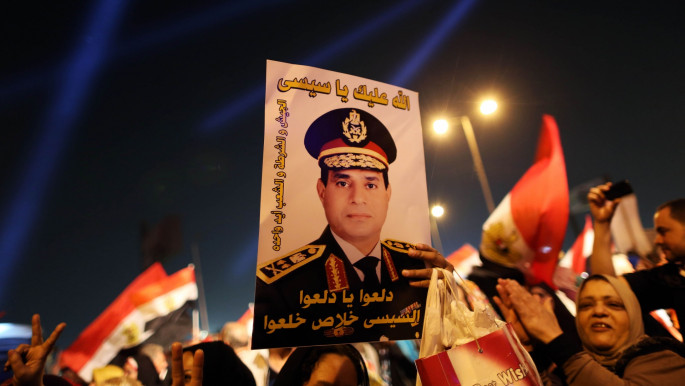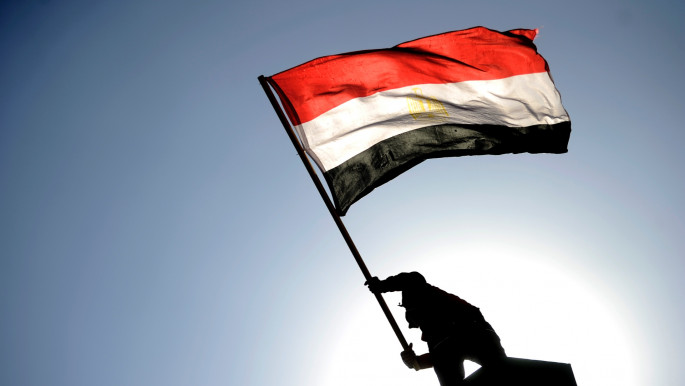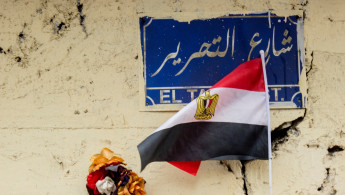Bracing for the Biden era, Egypt's Sisi intensifies brazen crackdown on human rights
While Egypt's regime released around 400 political detainees in the days preceding Biden's electoral triumph on 7 November, three members of the Egyptian Initiative for Personal Rights (EIPR) were subsequently detained a week later.
The three men, administrative manager Mohamed Basheer, head of criminal justice unit Karim Ennara and the group's executive director Gasser Abdel-Razek, have been charged by the state security prosecution with "membership of a terrorist organisation" and "using social media accounts to publish false news and information that may harm public peace and security."
According to EIPR, none of the three defendants were presented with any evidence or investigations to support such claims, commonly used by the regime against dissidents.
"The interrogations themselves focused on EIPR's activities in recent years, particularly its documentation of human rights violations in places of detention, and the unprecedented spike in death sentences and executions," EIPR said in a statement released in the early hours of 24 November, shortly after Abdel-Razek was interrogated for the second time.
 |
Sisi is taking advantage of the final months of the Trump administration before an inevitable recalibration of ties under Joe Biden |  |
"The same line of investigation was pursued…with Abdel-Razek as the prosecutor questioned him over 18 public statements and reports related to the Egyptian criminal justice system," the statement said, adding that this proves that the group is facing "a coordinated assault to punish [its members] for the totality of [its] activism."
Egyptian human rights defender Sherif Azer believes that "the recent escalation against EIPR has only made the already deteriorating human rights conditions in the country worse."
 |
|
| What's at stake for the Middle East's autocrats as a Biden victory looms? |
"These outright infringements violate both local and international laws. The regime seeks to silence any kind of activism that challenges it, proving how ignorant of laws it is," Azer, also a PhD student of international law at the UK's York University, told The New Arab.
Earlier in February, the authorities detained PhD student Patrick Zaki, also an EIPR gender rights researcher, at Cairo's airport on his way back from Italy for a brief visit to Egypt. The prosecution accused him of charges similar to his three colleagues. Since then, he has been kept in pre-trial detention - renewed every 45 days – without trial.
Pre-trial detention is an oppressive tool frequently used by the regime against rights defenders, journalists and members of opposition groups. First founded by rights defender Hossam Bahgat in 2002, EIPR has been one the few remaining rights groups functioning in Egypt after the military coup that overthrew the then-president Mohamed Morsi.
Bahgat was quick to take a stance against the crackdown on EIPR, temporarily taking the lead until the executive director is released. His decision was welcomed by social media activists who commended his bravery.
 |
These outright infringements violate both local and international laws. The regime seeks to silence any kind of activism that challenges it |  |
"Time to re-join [EIPR's] brave and talented staff in the face of this…war," he tweeted on 20 November. Bahgat himself was detained briefly back in 2015, which caused an international outcry that led authorities to release him.
Since Sisi took power, EIPR began operating on a low-profile, releasing reports, research papers, surveys and recommendations to the state's authorities and policy-makers on subjects pertaining to the Egyptian community. Such issues include the right to housing, healthcare, education and freedom of religious belief and sexual orientation.
Why now?
Sisi has been accused by local and international rights groups of overseeing Egypt's worst crackdown on human rights in decades, with thousands of his critics behind bars. Some suffered medical negligence and were left to die slowly, while dozens of others were executed.
The pressing question now is why the Sisi regime has risked provoking the outrage of the international community and abruptly defied Biden, who had frequently said - during his electoral campaign - that he would not tolerate human rights violations commonly committed in Egypt.
 |
|
| Read more: Biden and Sisi: A favourite dictator no more? |
The arrests of the local group members is believed to have been triggered by a meeting held on 3 November at the EIPR Cairo headquarters with several diplomats as well as ambassadors to a number of countries, including Germany, Britain, France, Italy, Canada and the European Union, to brief them about the status of civil rights in the country.
"Such a crackdown at this time following the release of hundreds of detainees this month proves that the regime has been provoked by the group's move," Azer said.
The arrests have sparked the outcry of local activists, dozens of rights groups, US senators and European governments. Even the United States under the presidency of Trump, an ally of Sisi, unexpectedly, swam with the current, announcing it was "deeply concerned" by the crackdown.
"The United States believes that all people should be free to express their beliefs and advocate peacefully," the US State Department's bureau tasked with human rights issues said. The US has often turned a blind eye to human rights violations taking place in Egypt throughout Trump's four-year tenure.
 |
Sisi has overseen Egypt's worst crackdown on human rights in decades, with thousands of his critics behind bars |  |
The Egyptian foreign ministry has recently denounced what it described as an interference in Egyptian domestic affairs, which stressed the regime's intention to warn off other groups against challenging its will, regardless of Biden's earlier statements.
Guilty until proven otherwise
The three men have been treated by pro-regime social media users as well as the Egyptian media and press as being guilty of the charges against them until proven innocent.
Ever since the EIPR were held in custody, a defamation campaign has been launched by several media outlets loyal to the regime against the organisation in general, and Bahgat in specific, who had quit his job as organisation head back in 2012 and shifted to journalism.
 |
|
| Read more: Weaponised censorship: The final demise of free expression in Egypt's media |
Some outlets even incited hatred against the organisation and its members. In a recent episode of a daily talk show presented by Naashat El-Deehi on private satellite TEN TV channel, he accused the group of promoting homosexuality and receiving foreign funds.
"They don't preach. They don't offer aid to the poor … help eradicate illiteracy or provide jobs. Unfortunately, the initiative cares for the inclusion of…homosexuals in the community," Deehi claimed, further accusing Bahgat of being the "representative of homosexuals in Egypt."
"Such accusations are outrageous, playing on the feelings of the supposedly religious Egyptian people and pushing away any kind of sympathy towards the three staffers," Egyptian rights lawyer Fahd El-Banna told The New Arab.
Another smear campaign was led by the notorious local Youm7 newspaper entitled: "the EIPR's black history," accusing the group of "fabricating reports" and "practicing espionage", though the prosecution has already charged the defendants of terrorism-related charges.
"It's illegal, in the first place, for the media and the press to tackle a case….and throw charges, while being investigated by the prosecution," Banna argued.
Horriya Marzouk is a pseudonym. The author resides in a jurisdiction where the publication of their identity may create a security or freedom of movement issue
Join the conversation: @The_NewArab



